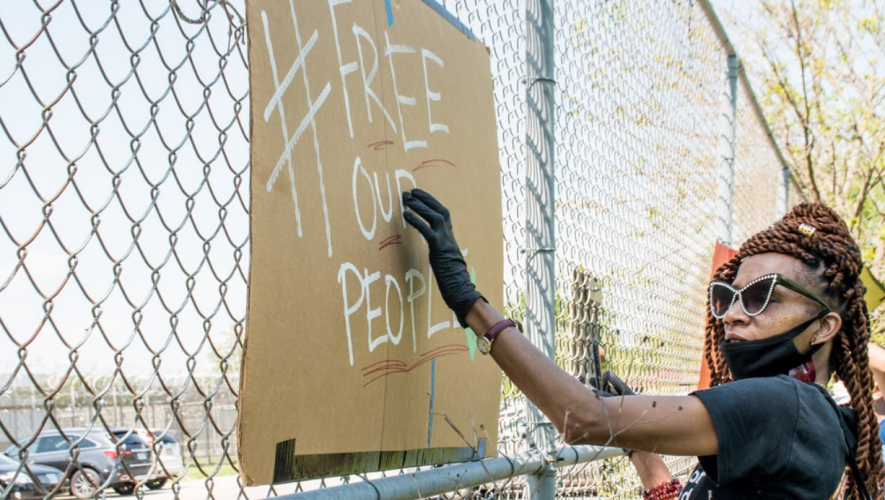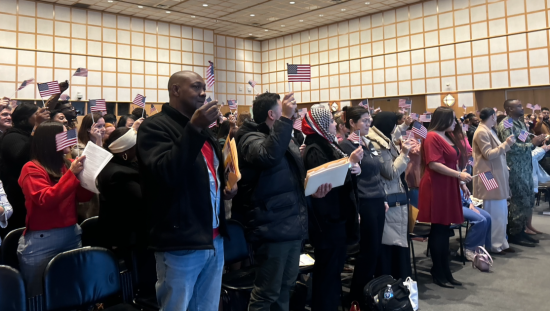In 2010, police arrested sixteen-year-old Kalief Browder for a robbery there was no evidence he committed, set his bail at $3,000, and imprisoned him on Rikers Island—all without a trial. The Bronx’s lengthy case backlog and expensive bail kept Browder imprisoned for three years, often in solitary confinement, until the district attorney dismissed the case. He committed suicide two years after his release.
No one should be imprisoned for poverty. However, in the US, this is an all too common reality. The judicial system’s lack of resources and sky-high bail costs create a cash-bail system that detains people, who are predominantly low-income, for years before they ever step foot in a courthouse.
Legislators intended bail—the price that a defendant must pay for release from jail before trial—to ensure that alleged criminals attend court. If the accused fails to appear, they (or those who paid their bail) don’t get their money back. But, in effect, bail criminalizes poverty. Requiring defendants to buy their freedom puts impoverished people at a disadvantage, regardless of their offense. It means that poor nonviolent offenders, who may have done nothing more than swipe five dollars, have to sit in jail indefinitely. Meanwhile, wealthy offenders in the same situation (or worse) walk free.
And, due to both blatant racism and the link between race and socioeconomic status, cash bail disproportionately impacts people of color. On average, judges set Black and Latino Americans’s bond costs higher than for White defendants who committed the same crime.
Worse, commercial bail bondsmen exploit the cash-bail system for profit, providing bail bonds to defendants and asking for a percentage of the bail amount as payment. Bail bond agencies often attach other requirements—such as property, high-interest rates, and ankle bracelets—as collateral to ensure that they make their money. It is no surprise that only the US and the Philippines allow these companies to dominate their system for pretrial release.
The effect of cash bail is striking: as of 2019, more than half a million of those imprisoned in the US are not convicted of a crime. And indefinitely jailing these people comes with a cost: $13.6 billion for local governments across the country.
In the spirit of reform, some activists propose using electronic monitors to track suspects instead of jailing them. However, these monitors hinder freedom by assuming guilt the same way that jailing does. There are various issues associated with the monitors, such as daily user fees for the wearers, the possibility of device malfunctions, and that wearing them can make daily life challenging.
Others recommend regulating bail amounts to ensure they are reasonable and affordable; bail costs for misdemeanors range from $100 to $20,000, depending on the circumstance and the state, but attempts to lower bail completely miss the point. Historically in the US, when judges determined a defendant was bailable, jails released them without upfront payments of their own—community members would pay retroactively if the defendant did not appear for trial. Now, accused criminals must deal with bail’s financial burdens themselves solely because fewer people are willing to pay for their release.
Some localities have even implemented pretrial algorithms to determine a defendant’s flight risk. However, these types of systems can be dehumanizing and racially biased. They rely on previous data about others who are demographically similar to the defendant they are trying to assess, ignoring the potential for positive change and the unique circumstances each person faces. Still, some places seem to have made this system work. In Yakima County, Washington, the implementation of a pretrial evaluation system saw an increased release rate across all racial categories, with the same court appearance rate as before its use.
The Bail Project, a non-profit with twenty-two offices nationwide, presents a different model for reform—structured the way bail worked originally—that they call Community Release with Support. The organization raises funds from people across the country and uses it to post bonds for defendants referred by their community and who judges deem eligible for bail. The decision to post bonds is also made based on the defendant’s past record of court appearances, the bail amount, and the reliability of a defendant’s contact information. With this model, The Bail Project releases defendants without creating a situation where they must return to court to retrieve the bonds they have posted.
The Bail Project also works with released defendants to overcome obstacles that may prevent them from returning for their court dates. Specifically, they send defendants reminders and cover transportation fees, leading more than 90 percent of their over 20,000 clients to appear for their court dates. Even the 10 percent that fails to show up can be explained by other circumstances, such as the need for childcare, unstable housing, and work. The Bail Project’s findings thoroughly debunk the notion that, without a financial incentive, people won’t return to court.
Some will always believe that the small chance of defendants fleeing to avoid court justifies avoiding this type of system. There have, unfortunately, been cases in which individuals have been released and become a danger to others. However, the entire cash-bail system should not be designed around these outliers. We don’t usually create laws based on worst-case scenarios. If we did, driving would be illegal because of the chance of a car crash—and car crashes kill more people than those released on bail. Further, for a defendant to be released, a judge has to determine that they are bailable, evaluating the circumstances of the case and whether or not they believe the accused will appear at trial. If a violent offender is bailable, that speaks more to the judge’s decision than bail amounts.
It’s time to reform the current bail system. Due process is not a privilege for those who can afford it; people should not suffer the punishment of alleged crimes before they’ve even had a trial. Local and state governments should consider abolishing cash bail, in the interest of their own budgets—and justice.


